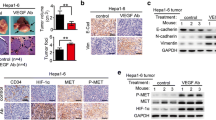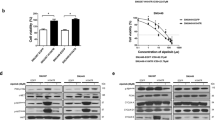Abstract
Lenvatinib is a long-awaited alternative to sorafenib for the first-line targeted therapy of patients with advanced hepatocellular carcinoma (HCC). However, resistance to lenvatinib has also become a major obstacle to improving the prognosis of HCC patients. The underlying molecular mechanisms contributing to lenvatinib resistance in HCC are largely unknown. HGF/c-MET axis activation is related to tumor progression and several hallmarks of cancer and is considered as the key contributor to drug resistance. In the present study, we focused on the role of the HGF/c-MET axis in mediating lenvatinib resistance in HCC cells. We showed that HGF reduced the antiproliferative, proapoptotic, and anti-invasive effects of lenvatinib on HCC cells with high c-MET expression but did not significantly affect HCC cells with low c-MET expression. The c-MET inhibitor PHA-665752 rescued HCC cells from HGF-induced lenvatinib resistance. Furthermore, HGF/c-MET activated the downstream PI3K/AKT and MAPK/ERK pathways and promoted epithelial–mesenchymal transition (EMT) in HCC cells. Collectively, our results suggested that combining lenvatinib treatment with a c-MET inhibitor may improve its systemic therapeutic efficacy in HCC patients with high c-MET expression.




Similar content being viewed by others
References
Kanwal F, Singal AG. Surveillance for hepatocellular carcinoma: current best practice and future direction. Gastroenterology. 2019;157(1):54–64. https://doi.org/10.1053/j.gastro.2019.02.049.
Pinter M, Peck-Radosavljevic M. Review article: systemic treatment of hepatocellular carcinoma. Aliment Pharmacol Ther. 2018;48(6):598–609. https://doi.org/10.1111/apt.14913.
Cainap C, Qin S, Huang WT, Chung IJ, Pan H, Cheng Y, et al. Linifanib versus sorafenib in patients with advanced hepatocellular carcinoma: results of a randomized phase III trial. J Clin Oncol. 2015;33(2):172–9. https://doi.org/10.1200/JCO.2013.54.3298.
Cheng AL, Kang YK, Lin DY, Park JW, Kudo M, Qin S, et al. Sunitinib versus sorafenib in advanced hepatocellular cancer: results of a randomized phase III trial. J Clin Oncol. 2013;31(32):4067–75. https://doi.org/10.1200/JCO.2012.45.8372.
Zhu AX, Rosmorduc O, Evans TR, Ross PJ, Santoro A, Carrilho FJ, et al. SEARCH: a phase III, randomized, double-blind, placebo-controlled trial of sorafenib plus erlotinib in patients with advanced hepatocellular carcinoma. J Clin Oncol. 2015;33(6):559–66. https://doi.org/10.1200/JCO.2013.53.7746.
Johnson PJ, Qin S, Park JW, Poon RT, Raoul JL, Philip PA, et al. Brivanib versus sorafenib as first-line therapy in patients with unresectable, advanced hepatocellular carcinoma: results from the randomized phase III BRISK-FL study. J Clin Oncol. 2013;31(28):3517–24. https://doi.org/10.1200/JCO.2012.48.4410.
Zhu AX, Kudo M, Assenat E, Cattan S, Kang YK, Lim HY, et al. Effect of everolimus on survival in advanced hepatocellular carcinoma after failure of sorafenib: the EVOLVE-1 randomized clinical trial. JAMA. 2014;312(1):57–67. https://doi.org/10.1001/jama.2014.7189.
Kudo M, Finn RS, Qin S, Han KH, Ikeda K, Piscaglia F, et al. Lenvatinib versus sorafenib in first-line treatment of patients with unresectable hepatocellular carcinoma: a randomised phase 3 non-inferiority trial. Lancet. 2018;391(10126):1163–73. https://doi.org/10.1016/S0140-6736(18)30207-1.
Bangaru S, Marrero JA, Singal AG. Review article: new therapeutic interventions for advanced hepatocellular carcinoma. Aliment Pharmacol Ther. 2020;51(1):78–89. https://doi.org/10.1111/apt.15573.
Moosavi F, Giovannetti E, Saso L, Firuzi O. HGF/MET pathway aberrations as diagnostic, prognostic, and predictive biomarkers in human cancers. Crit Rev Clin Lab Sci. 2019;56(8):533–66. https://doi.org/10.1080/10408363.2019.1653821.
You WK, McDonald DM. The hepatocyte growth factor/c-Met signaling pathway as a therapeutic target to inhibit angiogenesis. BMB Rep. 2008;41(12):833–9. https://doi.org/10.5483/bmbrep.2008.41.12.833.
Organ SL, Tsao MS. An overview of the c-MET signaling pathway. Ther Adv Med Oncol. 2011;3(1 Suppl):S7–S19. https://doi.org/10.1177/1758834011422556.
Kim KH, Kim H. Progress of antibody-based inhibitors of the HGF-cMET axis in cancer therapy. Exp Mol Med. 2017;49(3):e307. https://doi.org/10.1038/emm.2017.17.
Huang X, Gan G, Wang X, Xu T, Xie W. The HGF-MET axis coordinates liver cancer metabolism and autophagy for chemotherapeutic resistance. Autophagy. 2019;15(7):1258–79. https://doi.org/10.1080/15548627.2019.1580105.
Al-Salama ZT, Syed YY, Scott LJ. Lenvatinib: a review in hepatocellular carcinoma. Drugs. 2019;79(6):665–74. https://doi.org/10.1007/s40265-019-01116-x.
Raghav KP, Gonzalez-Angulo AM, Blumenschein GR Jr. Role of HGF/MET axis in resistance of lung cancer to contemporary management. Transl Lung Cancer Res. 2012;1(3):179–93. https://doi.org/10.3978/j.issn.2218-6751.2012.09.04.
Jeng KS, Chang CF, Jeng WJ, Sheen IS, Jeng CJ. Heterogeneity of hepatocellular carcinoma contributes to cancer progression. Crit Rev Oncol Hematol. 2015;94(3):337–47. https://doi.org/10.1016/j.critrevonc.2015.01.009.
Kim JH, Kim HS, Kim BJ, Jang HJ, Lee J. Prognostic value of c-Met overexpression in hepatocellular carcinoma: a meta-analysis and review. Oncotarget. 2017;8(52):90351–7. https://doi.org/10.18632/oncotarget.20087.
Chen KF, Chen HL, Tai WT, Feng WC, Hsu CH, Chen PJ, et al. Activation of phosphatidylinositol 3-kinase/Akt signaling pathway mediates acquired resistance to sorafenib in hepatocellular carcinoma cells. J Pharmacol Exp Ther. 2011;337(1):155–61. https://doi.org/10.1124/jpet.110.175786.
Serrano-Gomez SJ, Maziveyi M, Alahari SK. Regulation of epithelial-mesenchymal transition through epigenetic and post-translational modifications. Mol Cancer. 2016;15:18. https://doi.org/10.1186/s12943-016-0502-x.
Singh A, Settleman J. EMT, cancer stem cells and drug resistance: an emerging axis of evil in the war on cancer. Oncogene. 2010;29(34):4741–51. https://doi.org/10.1038/onc.2010.215.
van Malenstein H, Dekervel J, Verslype C, Van Cutsem E, Windmolders P, Nevens F, et al. Long-term exposure to sorafenib of liver cancer cells induces resistance with epithelial-to-mesenchymal transition, increased invasion and risk of rebound growth. Cancer Lett. 2013;329(1):74–83. https://doi.org/10.1016/j.canlet.2012.10.021.
Funding
This work was supported by the Medical Science and Technology Research Fund of Guangdong Province, China (Grant Number A2017387).
Author information
Authors and Affiliations
Contributions
(I) Conception and design: HC and XZ; (II) Administrative support: HC and XZ; (III) Provision of study materials: HC and XZ; (IV) Collection and assembly of data: RF, SJ, and JL; (V) Data analysis and interpretation: RF, SJ, and XZ; (VI) Manuscript writing: All authors; (VII) Final approval of manuscript: All authors.
Corresponding authors
Ethics declarations
Conflict of interest
The authors declare that they have no conflicts of interest in this work.
Additional information
Publisher's Note
Springer Nature remains neutral with regard to jurisdictional claims in published maps and institutional affiliations.
Rights and permissions
About this article
Cite this article
Fu, R., Jiang, S., Li, J. et al. Activation of the HGF/c-MET axis promotes lenvatinib resistance in hepatocellular carcinoma cells with high c-MET expression. Med Oncol 37, 24 (2020). https://doi.org/10.1007/s12032-020-01350-4
Received:
Accepted:
Published:
DOI: https://doi.org/10.1007/s12032-020-01350-4




